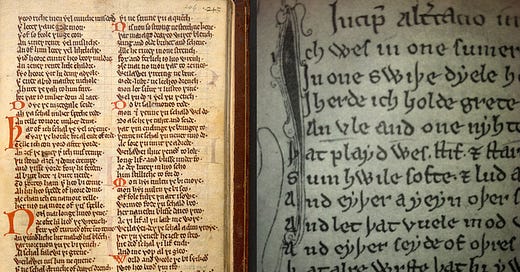Review: Ange Mlinko, Poets Translating
An owl and a nightingale squabble, in Middle English, back and forth in tetrameter couplets for almost 1,800 lines. At the end they decide to take their dispute to “that clever Simon Armitage” to adjudicate:
“He’s domiciled near Huddersfield,
in Yorkshire, nowhere near the sea
& nowhere near an estuary.
That’s where he lives, & in that town
he thinks wise thoughts & writes them down;
as far as Scotland life is better,
all because he’s good with letters.
Finding him won’t cause much strife,
he lives a solitary life ….”
In the original manuscript, the birds agree to see a “Maister Nichole,” who may or may not be the author of this poem, the provenance of which remains a mystery. The glimpse we get of its translator Armitage, though, suggests someone nearly as anonymous, with a monkish penchant for the scriptorium. This seems playfully ironic: as one of English poetry’s most recognizable names, Armitage is a former Oxford Professor of Poetry and current UK poet laureate. He also teaches at the University of Leeds. He is in fact a very public poet, and The Owl and the Nightingale is his fourth translation from Middle English, following on Pearl, The Death of King Arthur, and Sir Gawain and the Green Knight. He is carrying on the tradition of Seamus Heaney’s surprise bestseller, Beowulf, from 1999, which went on to spark a film adaptation.
Beowulf may be the most famous recent example of poets’ translations, but there are too many more to count. The long history of poetry in the British Isles ensures a wealth of Anglo-Saxon and Gaelic works to bring up to date, but translation from Latin and Greek has been crucial to English poetic pedagogy since the Renaissance. Heaney also translated Sophocles’s Philoctetes. His friend Ted Hughes, like Armitage a Yorkshire man and Poet Laureate, translated Aeschylus’s Oresteia trilogy and produced a book of Ovid versions. The number of prominent UK poets who either translate or write versions of Latin and Greek poems is striking. It may even form a substantial part of one’s poetic identity: Alice Oswald, who read Classics at Oxford, keeps returning to the wellsprings of Greece for such major works such Memorial, “Tithonus,” and Nobody; Christopher Logue refashioned books from the Iliad over many decades before his death in 2011. Outside of the British Isles I can think of few—Canadian Anne Carson, American A.E. Stallings—who have followed that path.
Keep reading with a 7-day free trial
Subscribe to Book Post to keep reading this post and get 7 days of free access to the full post archives.



